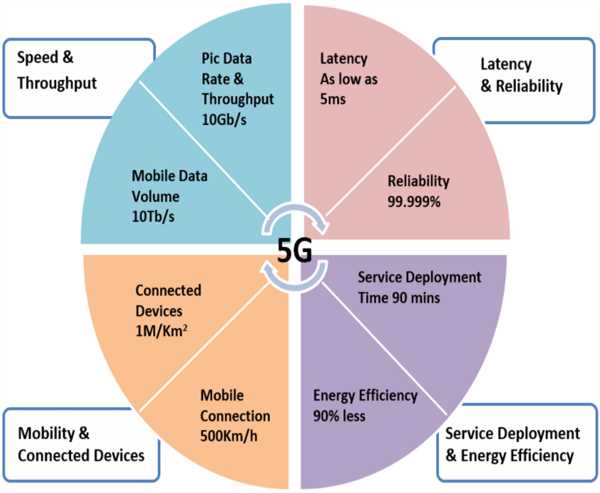- Faster speeds: 5G is significantly faster than previous generations of cellular technology. 5G can deliver peak data speeds of up to 10 gigabits per second, which is 100 times faster than 4G LTE. This means that users can download movies and TV shows in seconds, stream high-definition video without buffering, and play online games with no lag.

- Lower latency: Latency is the time it takes for data to travel from one point to another. 5G has much lower latency than previous generations of cellular technology. 5G latency is expected to be as low as 1 millisecond, which is 10 times lower than 4G LTE. This means that users will experience a more responsive and seamless experience when using applications and services that require real-time communication, such as video conferencing and online gaming.
- More capacity: 5G has much more capacity than previous generations of cellular technology. This means that more devices can be connected to the network at the same time without experiencing congestion. This is important for crowded areas, such as stadiums and concert venues, where there is a high demand for wireless data.
- Wider coverage: 5G has a wider coverage area than previous generations of cellular technology. This means that users will be able to connect to 5G networks in more places, including rural areas.
These are just some of the key features and advantages of 5G technology. 5G is expected to revolutionize the way we use the internet and mobile devices. It will enable new applications and services that were not possible with previous generations of cellular technology.
Here are some of the potential applications of 5G technology:
- Virtual reality and augmented reality: 5G will enable high-quality virtual reality and augmented reality experiences. This could be used for gaming, education, and training.
- Self-driving cars: 5G will be essential for self-driving cars. 5G's low latency and high capacity will allow self-driving cars to communicate with each other and with traffic infrastructure in real time.
- Internet of Things (IoT): 5G will enable the widespread adoption of the Internet of Things (IoT). IoT devices are connected to the internet and can collect and share data. 5G's high capacity will allow for millions of IoT devices to be connected to the network at the same time.
5G is still in its early stages of development, but it has the potential to revolutionize the way we live and work.